Two cohorts of University of Miami students—representing a mix of political persuasions—are spending the fall semester engaging in deliberative discourse as part of the Civic Synergy program offered through the College of Arts and Sciences and in conjunction with the George P. Hanley Democracy Center.
Civic Synergy was launched when the Hanley Democracy Center opened in Spring 2023 and has been offered each semester since. Students this fall are generating proposals on immigration and border security that will be presented to Miami-Dade County officials. Previous topics have focused on public safety and climate change.
“Students benefit in the form of completion certificates and the ability to add their participation to their resume, especially as more and more employers look for individuals who can engage in difficult conversations and work with others to solve problems,” explained Emily Danzinger, the center’s director of student relations. Program alumni gain access to internships and fellowships with the national program.
Two staff members are assigned to each team. Moderators are Hanley Democracy Center interns who guide the conversations toward program objectives and facilitators are trained facilitators, attorneys, or law students working on issues of mediation.
Five students from the program shared their insights below.
Melody Royaee is a sophomore pursuing prelaw studies and majoring in history and sociology. She grew up in Connecticut and Maryland.
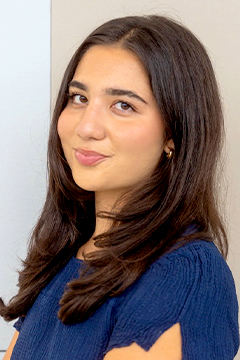
The chance to craft a policy proposal and present it to elected officials motivated Royaee to register for the program. She identified as “extremely pro-immigration” and explained that her stance owes to the fact that both her parents immigrated to the United States in the 1980s from Iran.
“If not for that, I’d be living under the Islamic regime in theocratic Iran,” she said. “Yet I understand the fear that some have of people who are undocumented. There are very legitimate insecurities amongst a lot of the American population of the crime they may be bringing in. Those fears are egged on by some media that highlight one-offs of a person committing a violent crime that feeds this broad fear of illegal immigration.”
A presentation by guest speaker Patricia A. Whitely, senior vice president for Student Affairs and Alumni Engagement, especially impressed Royaee.
“All our speakers have emphasized how civic discourse is at the core of American democracy and that it’s so important what we’re doing in the program.
“I was always open to deliberation, but I place even more value on it now, recognizing how important it is in today’s political climate where we’re super partisan and people tend to cling to their beliefs,” she said.
Sydney Harrison is a first-year student majoring in political science and criminology.
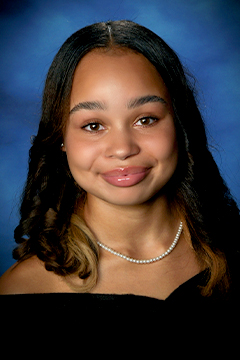
“It’s sometimes hard to know what’s factual in terms of politics, and I wanted to do something outside of my comfort zone and work with people who aren’t of my political persuasion.
“Our first conversation was initially tense because we all had different views and some of the people were immigrants or from families who were immigrants. But no one was ever rude, and it was very cordial when we got into what’s taught in schools and how homelessness is related to immigration. We all care about the same things and want to help people,” she said.
Harrison described herself as a mix of the environment where she grew up and of her Christian-based religion and its values. “I have a big heart, and, at first, I wasn’t 100 percent sure where I stood on immigration. Some people just don’t seem to care about immigrants. But I realized that it’s not so much that they don’t care but that they care more about the safety of the people here before letting anybody else in,” she said.
Harrison noted the massive backlog of immigration—some 300,000 in Miami-Dade County alone—and court dates scheduled out to 2027.
“The backlog is a big issue. The process takes so long, and they don’t have that time, so people may not go the legal route. We’re looking at more staffing and other options to manage that,” she said.
Gabriella Costa is a first-year student majoring in English literature with a minor in law and politics.
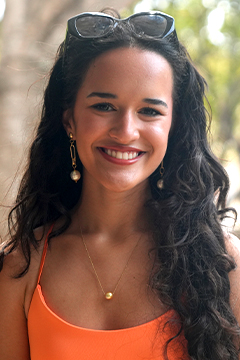
“I’ve always known that I wanted to go into law, but I’m still figuring out which area. I was interested in the program because it is related to government and the emphasis on collaboration, which is really important right now,” she said.
Costa doesn’t like political parties though understands their importance. She just registered to vote.
“I’m a registered Republican, but for the most part I tend to be centrist. I like to look at all sides and think it’s important not to box yourself in because that’s where we get into echo chambers and get the kind of discourse and controversy we have right now,” she said.
Costa grew up in Miami and is Cuban American. “When your parents escaped a communist dictatorship, they have very strong opinions and they’re not going to lean left. My family, friends, and neighbors—I’ve been exposed to their views from a very young age,” she said. “But I love reading and have learned and experienced a lot. I’ve seen both sides and don’t think it’s good to just follow either side blindly.”
She appreciates that her group is very diverse. “A lot are from out of state, so it’s been really interesting to hear their perspective because Miami is such a specific bubble. They share things I wouldn’t have considered because I’ve been so close to the issue,” she said.
The social media and 24-hour news cycle tends to create an “us-against-them” mentality, Costa said. “I like how the program is suggesting compromise and negotiation. We all want to solve the problem, and at the end of the day, our interests are the same. It’s been a good reminder that we want the same things and aren’t just trying to sabotage one another—we all want to make this country better.”
Ryan Skidmore is a junior majoring in political science and minoring in history and Judaic Studies.
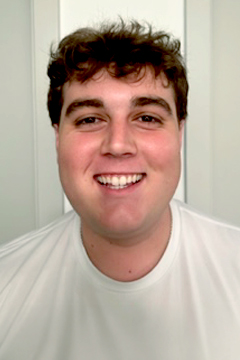
“I’m passionate about politics—I listen to two to three hours of political coverage a day and I read a lot of books—so something with a facilitated setting where we’re trying to come together for a common goal is really appealing,” he said. “Being able to come together from all sides of the political aisle to accomplish something that is a problem in the U.S.—or at least try to accomplish it—is something I was looking for.”
Skidmore leans right and considers himself a conservative. He appreciates that the class introduces students to bipartisanship.
“Because of the way our system is set up, we need bipartisanship to pass laws,” he noted. “So, it’s important that we understand now, at this young age, that we need to come together because 20 to 30 years from now people like us are going to be the lawmakers.”
He sees the development boom around his house in Palm Beach County as evidence of competent Republican leadership in Florida and believes there is common ground in recognizing that the immigration system needs reform.
“Now we do disagree and have a different set of ideas of how to fix it or how we should go about it, but we’re all coming from a place where we want to make the system better,” he said.
Skidmore noted that Florida has passed some very strict immigration laws. “So, there’s not a lot of leeway, and we have to play within the confines of the law because that’s what regulates where and how the local government gets its funding,” he said.
Cassie Cowen is a first-year economics major who grew up in the Chicago suburbs.
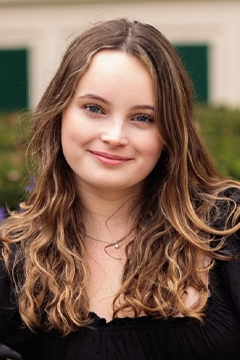
“I’m hoping to declare a law and politics minor, and I learned about the program in my American National Government [class],” she said. “Immigration is a very personal topic to a lot of people, and I was looking for ways to get involved on campus, so I applied.”
Cowen’s moderate stance stems from her personal experience. Her father, born and raised in Illinois, is more liberal—as is the Chicago area in general she noted—and her mother is an immigrant, born in Moscow, Russia.
“My mother’s side is considerably more conservative,” Cowen said. “I take from my own education and surroundings—I was exposed to two very different kinds of opinions—and don’t lean strongly either way.
“I’m personally very pro-legal immigration having witnessed both my mother and grandparents go through the process—it’s a very long ordeal,” Cowens said. “Yet with immigration, we’re not talking about the economy, taxes, or oil, but instead about real people with real stories. This course has helped me understand the other side and that you have to look at the human aspect of it.”
She’s convinced that the focus of the class has been invaluable in many ways.
“We’ve been learning a lot about discourse, whether it’s political or otherwise, and how to make it productive even within a polarized environment. So even if you don’t pursue a career in politics or law or anything of that field, we’re learning life skills,” she said.
Being open, honest with yourself, and ready to listen are the keys.
“If you’re not ready to listen, you’re never going to be able to expand your mindset. And if you can’t do that, it’s going to be very hard to move forward,” Cowen said. “Everyone needs to come with a mindset to be willing to listen and willing to contribute.
“Learning how to converse and get somewhere, rather than just talking and not hearing each other, that’s one of the most valuable skills you can have, especially in this polarized time,” Cowen said.

